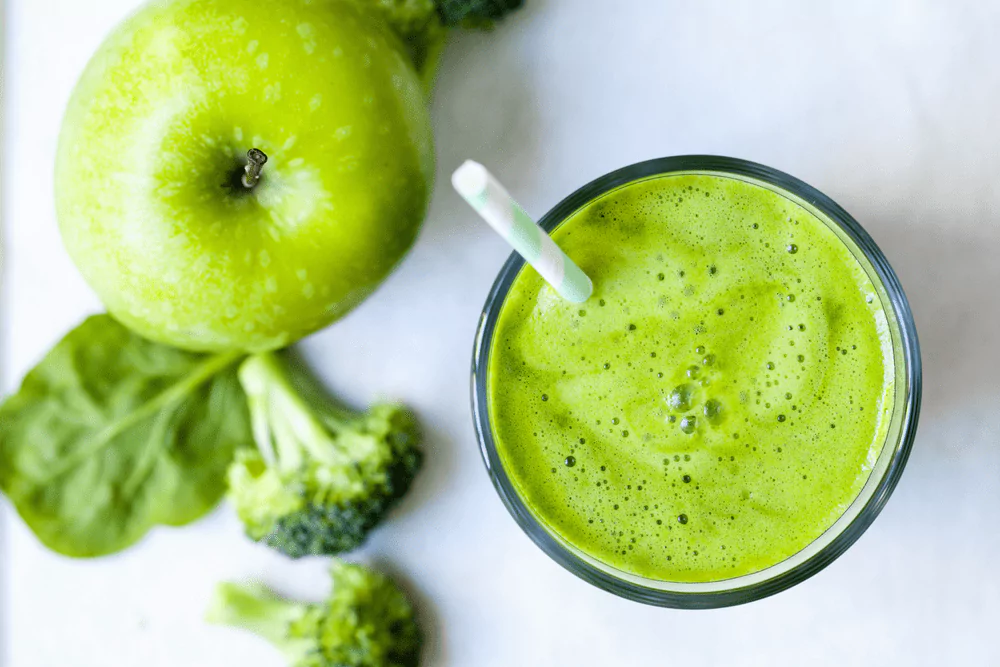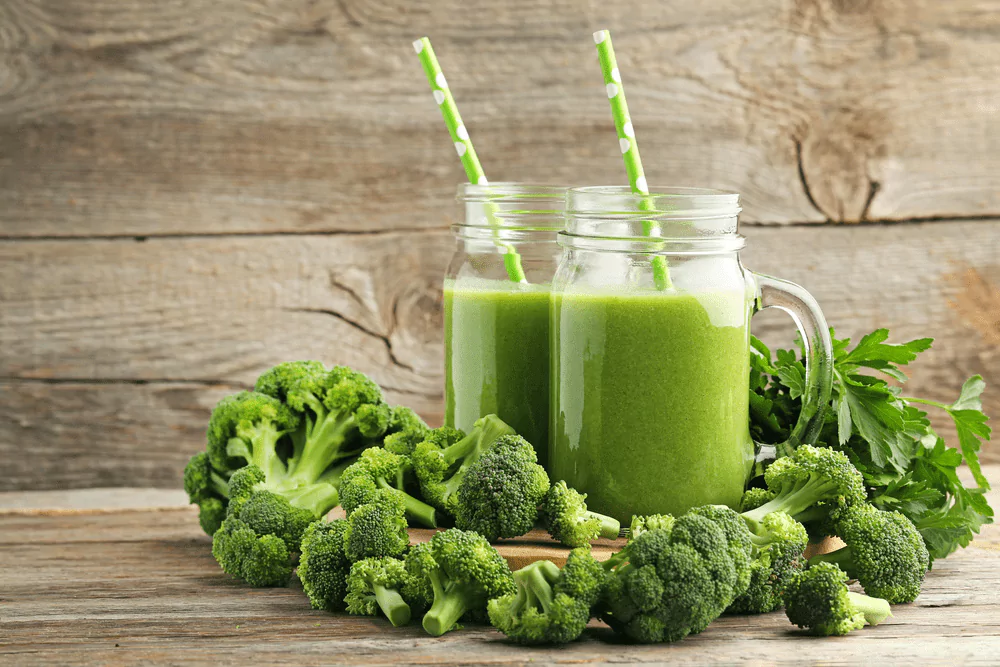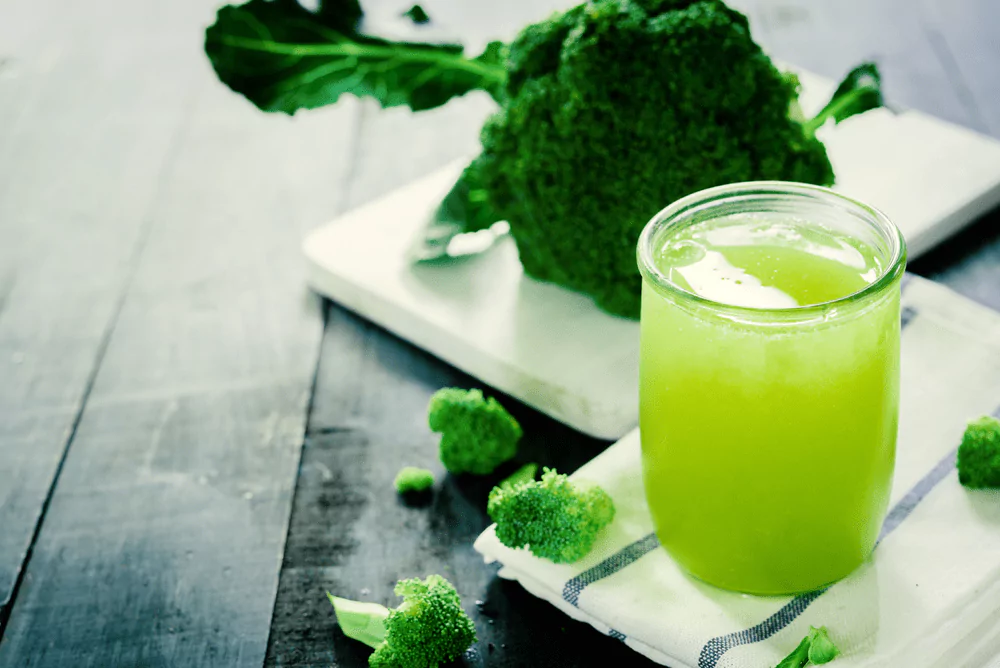A cruciferous vegetable known for its many health advantages, broccoli has become increasingly popular as a central component of juicing recipes in recent years. Rich in vital minerals and antioxidants, broccoli juice is a tasty and easy way to include this superfood in your daily diet. This post will examine the remarkable nutritional content of broccoli juice and some possible health advantages. Now grab your juicer and get ready to discover broccoli’s hidden powers!
What Is Broccoli Juice?
Vegetable juice made from the florets of the broccoli plant is known as broccoli juice. It has a wealth of antioxidants, vitamins, and minerals connected to several health advantages. This response will go over what broccoli juice is, some possible health advantages, and ways to include it in your diet.
Nutritional Info Of Broccoli Juice
| Nutrient | Amount |
| Calories | 34 |
| Total Fat | 0.6g |
| Saturated Fat | 0.1g |
| Cholesterol | 0mg |
| Sodium | 24mg |
| Potassium | 316mg |
| Total Carbohydrate | 6.6g |
| Dietary Fiber | 2.6g |
| Sugars | 1.7g |
| Protein | 2.8g |
Is Broccoli Juice A Good Source Of Vitamins And Minerals?

Broccoli juice is a rich source of minerals and vitamins. Broccoli is a vegetable high in nutrients that has many different essential vitamins and minerals in it. It is exceptionally high in potassium, folate, vitamin K, and C. Antioxidant vitamin C strengthens the immune system and encourages the creation of collagen for beautiful skin.
For healthy bones and blood clotting, vitamin K is essential. Folate is necessary for the formation and proliferation of cells, particularly during pregnancy. An electrolyte that supports healthy cardiac function and blood pressure regulation is potassium. Broccoli juice also contains other beneficial ingredients supporting general health and well-being, including fiber, antioxidants, and phytochemicals.
Health Benefits Of Broccoli Juice
Here are some of the vital health benefits of consuming broccoli juice:

Rich in Nutrients
Broccoli juice is a rich nutritional source. It has high potassium, vitamin K, folate, and vitamin C content. Antioxidant vitamin C promotes collagen formation for healthy skin and strengthens the immune system. Bone health and blood clotting are critical functions of vitamin K. Folate has a crucial role in cell formation and proliferation, particularly during pregnancy. Potassium lowers blood pressure and supports healthy cardiac function.
Powerful Antioxidant Properties
Antioxidants, including flavonoids, carotenoids, and glucosinolates, are plentiful in broccoli juice. These substances aid in shielding the body from the oxidative damage that free radicals produce. A lower risk of chronic illnesses, including cancer, heart disease, and neurological problems, has been associated with antioxidants.
Cancer Prevention
Sulforaphane, a substance with possible anticancer effects, is found in broccoli juice. Research has demonstrated that sulforaphane inhibits the development of cancer cells and encourages apoptosis, a process by which the cells destroy themselves. According to studies, drinking broccoli juice daily may help lower the chance of developing breast, prostate, lung, and colon cancers, among other cancers.
Digestive Health
As it encourages regular bowel movements and keeps constipation at bay, the fiber in broccoli juice supports healthy digestion. Furthermore, feeding the good bacteria in the intestines contributes to preserving a healthy gut flora.
Heart Health
Broccoli juice has heart-healthy properties because of its antioxidant, fiber, and potassium content. One of the ways that antioxidants can help lower heart disease risk factors is by reducing oxidative stress and inflammation. While potassium aids in blood pressure regulation, fiber helps decrease cholesterol levels.
How To Make Broccoli Juice At Home?
To make broccoli juice at home, you will need the following ingredients and equipment:
Ingredients
- Fresh broccoli
- Water (optional)
- Lemon or lime (optional for flavor)
Equipment
- Blender or juicer
- Knife
- Cutting board
- Strainer or cheesecloth (optional)
Here is a step-by-step guide on how to make broccoli juice:
- Thoroughly wash the broccoli under running water to remove any debris or dirt.
- The broccoli should be chopped into small florets with a knife and chopping board. If desired, you may additionally include the stems.
- The broccoli florets should be put in a juicer or blender. You should add a tiny bit of water to the blender to aid in the blending process.
- The broccoli should be juiced or blended to a smooth consistency. Blend the broccoli for one to two minutes or until no bits are visible.
- To improve the flavor of the broccoli juice, feel free to add a squeeze of lemon or lime.
- After blending, pass the juice through a cheesecloth or a sieve to remove any pulp or fiber still present. Instead, this can be skipped if you drink the juice without any fiber.
- After straining the juice, pour it into a glass and serve immediately.
3 Quick and Easy Recipes For Broccoli Juice
Here are three different broccoli juice recipes you can try at home:
Recipe 1: Basic Broccoli Juice
You will need:
- 2 cups broccoli florets
- 1 cucumber
- 1 green apple
- 1 lemon
To make juice:
- Wash all the ingredients thoroughly.
- Cut the broccoli florets into smaller pieces.
- Peel and chop the cucumber and green apple.
- Squeeze the juice from the lemon.
- Add all the ingredients to a juicer and process until smooth.
- Pour the juice into a glass and serve immediately.
Recipe 2: Broccoli-Ginger Juice
You will need:
- 2 cups broccoli florets
- 1 inch fresh ginger root
- 2 celery stalks
- 1 green apple
To make juice:
- Wash all the ingredients thoroughly.
- Cut the broccoli florets into smaller pieces.
- Peel and chop the ginger root.
- Chop the celery stalks and green apple.
- Add all the ingredients to a juicer and process until smooth.
- Pour the juice into a glass and serve chilled.
Recipe 3: Broccoli-Carrot Juice
You will need:
2 cups broccoli florets
2 carrots
1 orange
To make juice:
- Wash all the ingredients thoroughly.
- Cut the broccoli florets into smaller pieces.
- Peel and chop the carrots.
- Squeeze the juice from the orange.
- Add all the ingredients to a juicer and process until smooth.
- Pour the juice into a glass and serve over ice.
Can Broccoli Juice Help With Weight Loss?
No, drinking broccoli juice by itself won’t help you lose weight. Broccoli is a healthy food that is high in fiber and low in calories, but eating it as juice might not be as beneficial for weight reduction as eating the full vegetable. The fiber in vegetables is removed during the juicing process, which is crucial for boosting fullness and controlling blood sugar levels. Furthermore, losing weight is a complex process that calls for a mix of a good diet, consistent exercise, and other lifestyle choices. Offering vital nutrients and promoting general health, including broccoli juice in a balanced diet and exercise regimen, may help with weight loss indirectly.
Can Broccoli Juice Help In Preventing Certain Diseases?
Yes, broccoli juice can aid in the prevention of several illnesses. Vegetable broccoli is high in nutrients and contains different vitamins, minerals, and antioxidants that may offer health advantages. Broccoli juice’s high vitamin C, vitamin K, and folate content helps boost the immune system and lower the risk of chronic illnesses, including cancer and heart disease. Furthermore, broccoli contains sulforaphane, a chemical linked to anti-inflammatory and anticancer effects. As part of a balanced diet, regular broccoli juice drinking may improve general health and prevent illness.
Potential Side Effects Of Consuming Broccoli Juice
There are a few possible adverse effects of broccoli juice, although they are usually minor and rare. Individual responses can vary, so it is crucial to always speak with a healthcare provider before making significant dietary changes or drinking excessive amounts of food or drink.
Digestive Issues
As broccoli juice has a high fiber content, it may help digestion. However, if they drink a lot of broccoli juice, some people could have digestive problems, including gas, bloating, or diarrhea. This is particularly true for those who don’t often eat meals high in fiber or who have sensitive digestive systems.
Thyroid Interference
Broccoli is a member of the cruciferous vegetable family, including Brussels sprouts, kale, and cabbage. When ingested in excess, the goitrogens included in these plants might cause problems with thyroid function. Goitrogens can prevent iodine from being absorbed, which is necessary for synthesizing thyroid hormone. But unless it’s ingested in excess, the level of goitrogens in broccoli juice is usually not high enough to cause thyroid issues.
Allergic Reactions
Although uncommon, some people may be intolerant to particular substances found in broccoli or develop an allergy to the vegetable. An allergic response can cause breathing difficulties, hives, facial or throat swelling, itching, and gastrointestinal upset. Getting medical help immediately is critical if you encounter any of these symptoms after drinking broccoli juice.
Tips For Incorporating Broccoli Juice Into Your Diet
Broccoli juice is a nutrient-dense beverage with numerous health benefits due to its high concentration of vitamins, minerals, and antioxidants. Here are some tips for incorporating broccoli juice into your diet:
- Broccoli juice can taste strong, so consider mixing it with other juices like apple or carrot to make it more palatable.
- Opt for fresh broccoli instead of frozen or canned varieties to ensure maximum nutritional benefits.
- Include the broccoli’s florets and stems when juicing to get a broader range of nutrients.
- Add ingredients like lemon, ginger, or mint to enhance the flavor of your broccoli juice and make it more enjoyable.
- Broccoli juice is best consumed immediately after juicing to retain its nutritional value.
- If you need to store broccoli juice, do so in an airtight container in the refrigerator for up to 24 hours.
Conclusion
To sum up, the secret to the effectiveness of broccoli juice is its capacity to utilize the nutritious value of cruciferous vegetables fully. Rich in vital vitamins, minerals, and antioxidants, broccoli juice can support general health and well-being.
Frequent intake of broccoli juice has been associated with several health advantages, such as better immune system function, less inflammation, better digestion, and even possible anticancer effects. Broccoli juice’s high fiber content can also support a healthy circulatory system and help with weight control. Broccoli juice may be a simple yet powerful strategy to support optimal health and increase your nutritional intake in your regular diet.
FAQs
Is Drinking Broccoli Juice Good For You?
Yes, drinking broccoli juice can be good for you as it is packed with essential nutrients such as vitamins A, C, and K and minerals like potassium and calcium.
Is It Safe To Juice Raw Broccoli?
Yes, it is safe to juice raw broccoli. However, it is essential to note that raw broccoli can be tricky and fibrous, which may make it difficult to blend or juice.
Is Broccoli Worth Juicing?
Broccoli is worth juicing due to its high nutritional content. Juicing broccoli allows for easier absorption of its nutrients by the body compared to consuming it in its whole form.
What Does Broccoli Juice Taste Like?
Broccoli juice has a distinct taste described as slightly bitter and earthy. Some people may find the taste strong or overpowering when consumed independently.
How To Make Broccoli Juice In A Blender?
To make broccoli juice in a blender, follow these steps:
- Wash the broccoli thoroughly and cut it into small florets.
- Place the florets in a blender with a small amount of water or other liquid you choose.
- Blend on high speed until the mixture becomes smooth and liquefied.
- Strain the juice through a fine mesh strainer or cheesecloth to remove any remaining pulp.
- Serve immediately and enjoy!




![5 Best Ways for Juice Storage - [ Store Fruits & Vegetables Juice ] Juice Storage](https://juicerhunter.com/wp-content/uploads/2024/01/Juice-Storage-150x150.webp)

